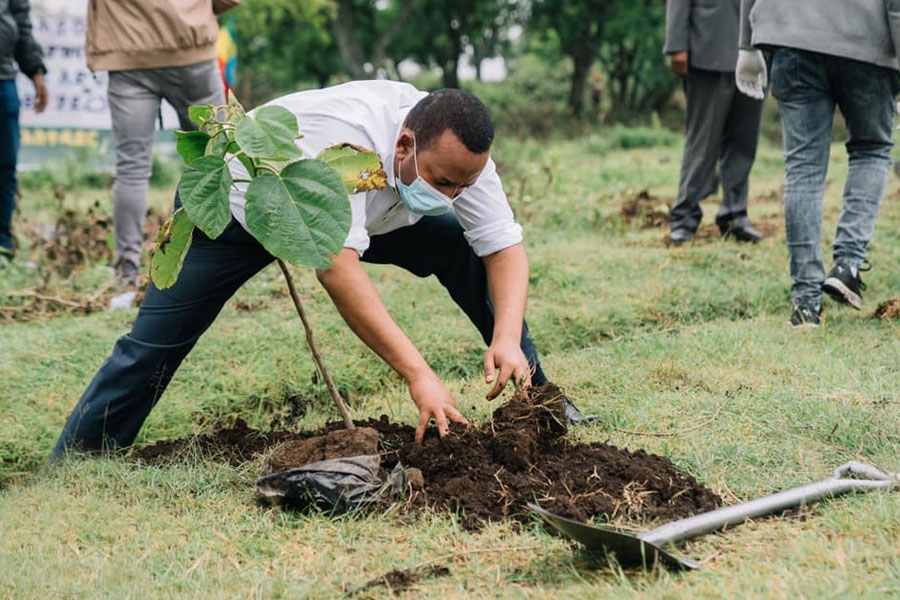
View From Arada | Feb 06,2021
Apr 4 , 2020
By QU Dongyu
There is enough supply of food in the world to feed everyone, but the challenge that food may not be made available where it is needed must be faced, writes QU Dongyu (PhD), director-general of the Food & Agriculture Organisation (FAO) of the United Nations.
The Novel Coronavirus (COVID-19) pandemic is putting enormous strains on public health systems around the world, and millions of people in the world’s most advanced economies are in some form of quarantine.
We know the human toll will be high and that massive efforts to turn the tide carry a heavy economic cost. To reduce the risk of an even greater toll - shortage of food for millions, even in affluent countries - the world must take immediate actions to minimise disruptions to food supply chains.
A globally coordinated and coherent response is needed to prevent this public health crisis from triggering a food crisis in which people cannot find or afford food.
For now, COVID-19 has not entailed any strain on food security, despite anecdotal reports of crowded supermarket sieges.
While there is no need for panic - there is enough supply of food in the world to feed everyone - we must face the challenge: an enormous risk that food may not be made available where it is needed.
COVID-19, with all the accompanying closures and lockdowns, has created logistical bottlenecks that are ricocheting across the long value chains of the modern global economy.
Restrictions on movement, as well as basic aversion behaviour by workers, may impede farmers from reaching food processors - who handle most agricultural products. Shortage of fertiliser, veterinary medicines and other inputs could also affect agricultural production.
Closures of restaurants and less frequent grocery shopping diminish demand for highly perishable fresh produce and fish, affecting producers and suppliers, especially smallholder farmers, with long-term consequences for the world’s increasingly urbanised population, whether in Manhattan or Manila.
Uncertainty about food availability can induce policymakers to implement restrictive trade measures to safeguard national food security. Given the experience of the 2007-2008 global food price crisis, we know that such measures can only exacerbate the situation.
Export restrictions put in place by exporting countries to increase food availability domestically could lead to serious disruptions in the world food market, resulting in price spikes and increased price volatility.
In 2007-2008, these immediate measures proved extremely damaging, especially for low-income, food-deficit countries and to the efforts of humanitarian organisations to procure supplies for the needy and vulnerable.
We should all learn from our recent past and not make the same mistakes twice. Policymakers must take care to avoid accidentally tightening food supply conditions.
While every country faces its challenges, collaboration between governments and the full gamut of sectors and stakeholders is paramount. We are experiencing a global problem that requires a global response.
We must ensure that food markets are functioning properly and that information on prices, production, consumption and stocks of food is available to all in real-time. This approach will reduce uncertainty and allow producers, consumers, traders and processors to make informed decisions and to contain unwarranted panic behaviour in global food markets.
The health impacts of the unfolding COVID-19 pandemic on some of the poorest countries are still unknown. Yet we can say with certainty that any ensuing food crisis as a result of poor policymaking will be a humanitarian disaster that we can avert.
We already have 113 million people experiencing acute hunger. In Sub-Saharan Africa, a quarter of the population is undernourished. Any disruptions to food supply chains will intensify both human suffering and the challenge of reducing hunger around the world.
We must do everything possible not to let that happen. Prevention costs less. Global markets are critical for smoothing supply and demand shocks across countries and regions, and we need to work together to ensure that disruptions of food supply chains are minimised as much as possible.
COVID-19 forcefully reminds us that solidarity is not charity but common sense.
PUBLISHED ON
Apr 04,2020 [ VOL
21 , NO
1040]


View From Arada | Feb 06,2021

Sunday with Eden | Jun 20,2020

Editorial | Jul 25,2020

Viewpoints | Feb 29,2020

Commentaries | Oct 14,2023

Fortune News | Nov 18,2023

Verbatim | Nov 04,2023

Commentaries | Mar 28,2020

Commentaries | Nov 27,2021

Verbatim | Nov 07,2020

My Opinion | 131548 Views | Aug 14,2021

My Opinion | 127903 Views | Aug 21,2021

My Opinion | 125879 Views | Sep 10,2021

My Opinion | 123509 Views | Aug 07,2021

Dec 22 , 2024 . By TIZITA SHEWAFERAW
Charged with transforming colossal state-owned enterprises into modern and competitiv...

Aug 18 , 2024 . By AKSAH ITALO
Although predictable Yonas Zerihun's job in the ride-hailing service is not immune to...

Jul 28 , 2024 . By TIZITA SHEWAFERAW
Unhabitual, perhaps too many, Samuel Gebreyohannes, 38, used to occasionally enjoy a couple of beers at breakfast. However, he recently swit...

Jul 13 , 2024 . By AKSAH ITALO
Investors who rely on tractors, trucks, and field vehicles for commuting, transporting commodities, and f...

Jun 28 , 2025
Meseret Damtie, the assertive auditor general, has never been shy about naming names...

Jun 21 , 2025
A well-worn adage says, “Budget is not destiny, but it is direction.” Examining t...

Jun 14 , 2025
Yet again, the Horn of Africa is bracing for trouble. A region already frayed by wars...

Jun 7 , 2025
Few promises shine brighter in Addis Abeba than the pledge of a roof for every family...

Jun 29 , 2025
Addis Abeba's first rains have coincided with a sweeping rise in private school tuition, prompting the city's education...

Jun 29 , 2025 . By BEZAWIT HULUAGER
Central Bank Governor Mamo Mihretu claimed a bold reconfiguration of monetary policy...

Jun 29 , 2025 . By BEZAWIT HULUAGER
The federal government is betting on a sweeping overhaul of the driver licensing regi...

Jun 29 , 2025 . By NAHOM AYELE
Gadaa Bank has listed 1.2 million shares on the Ethiopian Securities Exchange (ESX),...